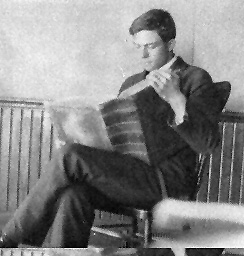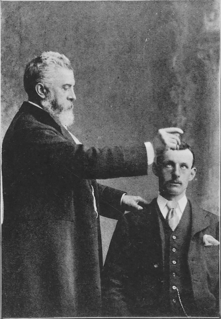Related Research Articles

Hypnosis is a human condition involving focused attention, reduced peripheral awareness, and an enhanced capacity to respond to suggestion.
Hypnotherapy is a type of mind-body intervention in which hypnosis is used to create a state of focused attention and increased suggestibility in the treatment of a medical or psychological disorder or concern.
Dissociative identity disorder (DID), previously known as multiple personality disorder (MPD) and colloquially known as split personality disorder, is a mental disorder characterized by the maintenance of at least two distinct and relatively enduring personality states. The disorder is accompanied by memory gaps beyond what would be explained by ordinary memory issues. The personality states alternately show in a person's behavior; however, presentations of the disorder vary. Other conditions that often occur in people with DID include post-traumatic stress disorder, personality disorders, depression, substance use disorders, conversion disorder, somatic symptom disorder, eating disorders, obsessive–compulsive disorder, and sleep disorders. Self-harm, non-epileptic seizures, flashbacks with amnesia for content of flashbacks, anxiety disorders, and suicidality are also common.

Milton Hyland Erickson was an American psychiatrist and psychologist specializing in medical hypnosis and family therapy. He was founding president of the American Society for Clinical Hypnosis and a fellow of the American Psychiatric Association, the American Psychological Association, and the American Psychopathological Association. He is noted for his approach to the unconscious mind as creative and solution-generating. He is also noted for influencing brief therapy, strategic family therapy, family systems therapy, solution focused brief therapy, and neuro-linguistic programming.
Suggestibility is the quality of being inclined to accept and act on the suggestions of others. One may fill in gaps in certain memories with false information given by another when recalling a scenario or moment. Suggestibility uses cues to distort recollection: when the subject has been persistently told something about a past event, his or her memory of the event conforms to the repeated message.
Self-hypnosis or auto-hypnosis is a form, a process, or the result of a self-induced hypnotic state.
Dissociation, as a concept that has been developed over time, is any of a wide array of experiences, ranging from a mild emotional detachment from the immediate surroundings, to a more severe disconnection from physical and emotional experiences. The major characteristic of all dissociative phenomena involves a detachment from reality, rather than a loss of reality as in psychosis.
The Nancy School was a French hypnosis-centered school of psychotherapy. The origins of the thoughts were brought about by Ambroise-Auguste Liébeault in 1866, in Nancy, France. Through his publications and therapy sessions he was able to gain the attention/support from Hippolyte Bernheim: another Nancy Doctor that further evolved Liébeault's thoughts and practices to form what is known as the Nancy School.
Ego-state therapy is a parts-based psychodynamic approach to treat various behavioural and cognitive problems within a person. It uses techniques that are common in group and family therapy, but with an individual patient, to resolve conflicts that manifest in a "family of self" within a single individual.
The development of concepts, beliefs and practices related to hypnosis and hypnotherapy have been documented since prehistoric to modern times.
Covert hypnosis is an attempt to communicate with another person's unconscious mind without informing the subject that they will be hypnotized. It is also known as conversational hypnosis or sleight of mouth. It is a term largely used by proponents of neuro-linguistic programming (NLP), a pseudoscientific approach to communication and interaction.
Nicholas Peter Spanos, was professor of psychology and director of the Laboratory for Experimental Hypnosis at Carleton University from 1975 to his death in a single engine plane crash on June 6, 1994. Spanos conducted multiple studies that challenged common beliefs. He tried to distinguish the difference between common beliefs about hypnosis and what was actually occurring. These studies conducted by Spanos led to the modern understanding that hypnosis is not an altered state and is actually suggested behaviors that the participant chooses to go along with or not. Along with this, Spanos conducted studies regarding dissociative identity disorder in which he stated that multiple personalities are not a product of trauma but are based on social norms.
Age regression in therapy is a psycho-therapeutic process that aims to facilitate access to childhood memories, thoughts, and feelings. Age regression can be induced by hypnotherapy, which is a process where patients move their focus to memories of an earlier stage of life in order to explore these memories or to access difficult aspects of their personality.

Stephen R. Lankton, MSW, DAHB is a psychotherapist, consultant, and trainer. He is the current Editor-in-Chief of the American Journal of Clinical Hypnosis (2005–2025). He is a recipient of the American Society of Clinical Hypnosis' "Lifetime Achievement Award" and “Irving Sector Award for Advancement of the Field of Hypnosis”. as well as the Milton H. Erickson Foundation “Lifetime Achievement Award for Outstanding Contributions to the Field of Psychotherapy.”

Deirdre Barrett is an American author and psychologist known for her research on dreams, hypnosis and imagery, and has written on evolutionary psychology. Barrett is a teacher at Harvard Medical School, and a past president of the International Association for the Study of Dreams and of the American Psychological Association’s Div. 30, the Society for Psychological Hypnosis. She is editor-in-chief of the journal Dreaming: The Journal of the Association for the Study of Dreams and a consulting editor for Imagination, Cognition, and Personality and The International Journal for Clinical and Experimental Hypnosis.

Hypnotic induction is the process undertaken by a hypnotist to establish the state or conditions required for hypnosis to occur.
Multiplicity or plurality is the psychological phenomenon in which a body can display multiple distinct personas. This phenomenon can feature in identity disturbance, dissociative identity disorder, and other specified dissociative disorders, among other things. Some individuals describe their experience of multiplicity as a form of neurodiversity, rather than something that demands a diagnosis. Since 1994, the Diagnostic and Statistical Manual of Mental Disorders 5 (DSM-5) no longer refers to it as "multiple personality disorder", favoring other terms. Multiplicity can also be referred to as personality style defined as "an individual's relatively consistent inclinations and preferences across contexts."
Sports hypnosis refers to the use of hypnotherapy with athletes in order to enhance sporting performance. Hypnosis in sports has therapeutic and performance-enhancing functions. The mental state of athletes during training and competition is said to impact performance. Hypnosis is a form of mental training and can therefore contribute to enhancing athletic execution. Sports hypnosis is used by athletes, coaches and psychologists.

Hypnoanalysis is the technique of using hypnosis in the practice of psychoanalysis and psychotherapy. It attempts to utilize the trance state induced by hypnosis to effect a conscious understanding of a person's unconscious psychodynamics.
Josephine Rohrs Hilgard was an American developmental psychologist, psychiatrist, and psychoanalyst. She was a clinical professor in the Department of Psychiatry at Stanford Medical School. She conducted research on mental health and developed the theory of "anniversary reactions", which described how psychiatric issues might be triggered at anniversaries of significant events in a patient's life. She also specialized in hypnotherapy, and published research on the theory and practice of hypnosis.
References
- 1 2 "John-G.-Watkins-Obituary". Bainbridgepsychology.com. Archived from the original on 2014-04-20. Retrieved 2012-10-17.
- ↑ "Nation: Murderous Personality - Printout". TIME. 1979-05-07. Archived from the original on 2013-02-04. Retrieved 2012-10-17.
- ↑ Ph.D, John G. Watkins; Watkins, Helen H. (1990-07-01). "Dissociation and Displacement: Where Goes the "Ouch?"". American Journal of Clinical Hypnosis. 33 (1): 1–10. doi:10.1080/00029157.1990.10402895. ISSN 0002-9157. PMID 2220652.
- ↑ Watkins, J. G.; Watkins, H. H. (1988). "The Management of Malevolent Ego State s in Multiple Personality Disorde r". S2CID 146483097 . Retrieved 2021-09-08.